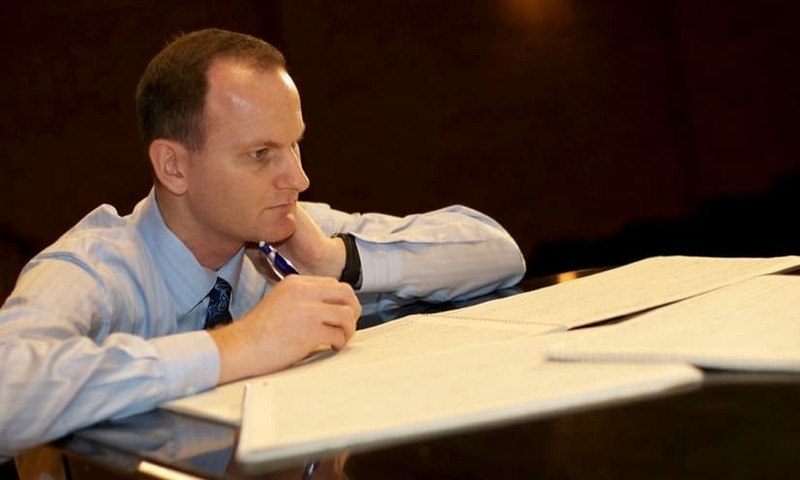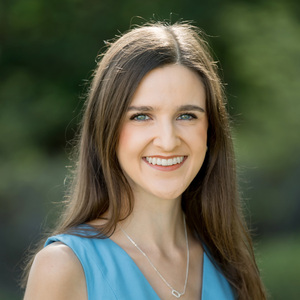From Biola University trumpet performance graduate in 1997 to Conservatory of Music faculty member starting in 2007, music theory and composition professor Dr. Robert Denham finds himself deep in the world of composition. Recently, Denham was recognized as the third place winner in the composer of band/wind ensemble category of the American Prize National Nonprofit Competitions in the Performing Arts. Discovering his passion for composing while a student at Biola, Denham has been preparing pieces of music for this competition for 12 years now, winning first prize in different categories in 2018 and 2019 and honorable mentions in other years.
Read more about how Denham’s journey in music composition helped get him to where he is today.
For this competition, what was the preparation process like?
My third place finish this year is for my Concerto for Bass Trombone and Wind Ensemble. Ilan Morgenstern, bass trombonist of the Vancouver Symphony Orchestra, recorded this piece along with the University of Redlands Wind Ensemble. He included it, along with several other works of mine, on his album “It's Alive: New Music for Bass Trombone” (available on music streaming services). I have found that quality recordings count favorably in the judges' minds — they like to know that the pieces are actually playable by live players. It also helps if the recordings are made by ensembles or soloists of renown; this displays a sort of peer review in its own rite, since these performers are often picky in terms of what they choose to spend their time rehearsing and performing.
I am extremely thankful to Biola University for their support; I have been blessed with three R&D grants through the years, and a Provost Grant last year, that have helped me pursue recording opportunities for my original compositions. The Provost Award enabled me to record my work for orchestra, Shards of Gold and Amethyst, with the Czech National Symphony Orchestra in the fall of 2023. I actually submitted this piece, along with this recording, for next year's American Prize in the Compositions for Orchestra division.
How did your passion for composition begin?
Before the age of 20 I was under the misapprehension that composing was a thing of the past, and that it was not something that people living in the 1990s were actually still doing. If your name wasn't Bach, or Mozart, or Debussy, and you weren't dead already, then you must not be a composer (it didn't dawn on me that all the film music I heard in theaters had to come from somewhere!). And so, when I sat down to try to write a piece for the first time (and this first attempt failed miserably by the way) I felt that I was the only person in the world that was doing this, and that I was essentially resurrecting some sort of lost art. Admittedly, it was kind of fun to think this way!
I was a Trumpet Performance major at Biola and the composition area in the Conservatory was quite small — maybe 5 or 6 students. Dr. Edwin Childs was the director of the program at that time, and he had set up an annual composition contest for the composition students. Non-majors were welcome to join, and so I decided to put something together and put it on the program. I wrote a short set of duets for trumpet and tuba; all of this was hand-written, as computer notation (or engraving, as we like to call it) was a very new idea at the time.
God stepped in at this moment, because truthfully, I didn't belong in the winner's circle for this contest. The piece that should have won first prize did not even place, and I ended up getting third prize. I do count this as a defining moment in my life. From that point on, I fell in love with composition. I would compose whenever I could, whether that be Thanksgiving break, weekends, or even on summer evenings after doing manual labor all day long (I needed to earn enough money to come back to Biola!). God also prompted me along by means of key faculty members, including Ed Childs, Cliff Hulling, and Marlin Owen, and with encouragement from my fellow music majors to guide me along this path.
By the end of my Bachelor’s in Music degree I knew I wanted to pursue composition and teach at the university level. And so, after a couple of graduate degrees in composition, here I am, back at Biola, doing what I love to do!
How do you hope to see young musicians and/or composers at Biola lean into their calling despite discouragement or hiccups?
Although most people struggle with self-confidence and self-worth, I think that musicians and artists in general struggle with these things in a unique way. For us as composers, the question is whether or not the work we produce has any integrity at all. I distinctly remember an older student coming out of Dr. Childs' office, and saying out loud “Oh, I just write garbage.” Dr. Childs immediately corrected him, telling him that this was most certainly not the case. But this is a common symptom that we see in these fields — students preemptively say negative things about their own work, before someone else has the opportunity to criticize them.
I remember putting a slightly different spin on this when I was a student. I once spent an entire day at the end of Torrey Conference writing music, when I could have been practicing my trumpet, writing a paper or spending time with friends. I came out of my writing space and in despair I blurted out “I just wasted an entire day composing.” Cliff Hulling pulled me aside and set me straight. “That's not a waste, that's precious time building your craft!,” he said. He was right; composing is a worthwhile endeavor, and it is worth the time it requires.
To answer the question more directly, I think that music students need to fight to retain a correct perspective on their place in this world and before God. If the Lord has called us to this path, then he will sustain us along the way. Obstacles and challenges are something we need to expect. Students need to anticipate that the road to success in the music industry will not be a smooth one. If they know this at the start of their journey, then it will not shock them when the storms come. But again, we are not alone – the Lord is there with us.
What advice do you have for today’s composition student?
One way that I see students avoiding the storms is to duck away from constructive criticism. This doesn't do them any favors though, and without feedback from trusted sources they can't grow in the way they otherwise would. I believe that the best way to grow is to forge ahead with boldness (write music without fearing what others will think), while allowing trusted sources to point out our shortcomings with the purpose of helping us to grow, and then repeat the whole cycle over again. To me, this parallels what James 5:16 calls us to do in our spiritual walks (confess your sins to each other and pray for each other so that you may be healed).
There will be challenges; there will be self-doubt; there is a deceiver who wants to convince us that our work doesn't count for anything. This all should not come as a surprise; Jesus does not withhold from us the truth that we will have trouble in this world (John 16:33). While it would be easy to claim that the obstacles we encounter are, in every case, a sign from the Lord that we should not continue in our calling, I think we ought to instead give careful consideration to the fact that these may just be normal bumps in the road. And so, if this is true, we press toward the goal to win the prize for which God has called us heavenward in Christ Jesus (Phil. 3:14).
Recordings of Denham’s pieces can be found on his website at RobertDenham.com.
Interview conducted by Sarah Dougher, media relations specialist. For more information, or if you are interested in being featured in a Faculty Highlight, please email media.relations@biola.edu.
 Biola University
Biola University

_(1).jpg)
_(1).jpg)